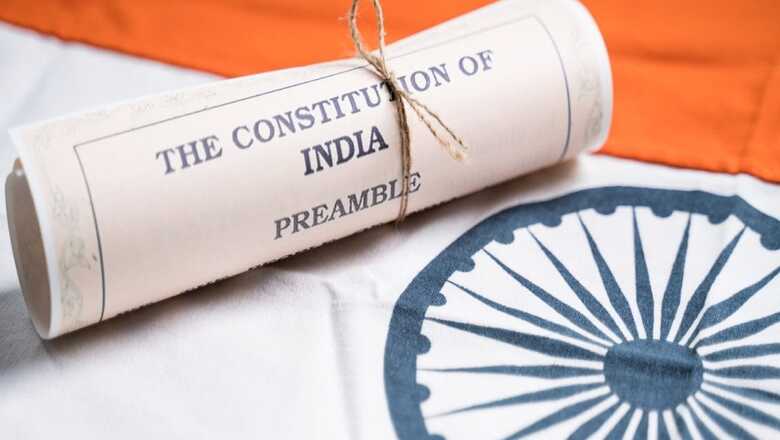
views
The closing debate of the iconic Jaipur Literature Festival (JLF) is hugely popular, and is, in a sense, the finale of the five-day event, with an audience in thousands. The topics for the debate are deliberately provocative so that, in the best spirit of debating, the audience is both interested and involved. This year, the topic was – ‘Free Speech Will Survive Surveillance Technology and Privacy Invasions’.
I have participated in these closing debates several times in the past. For the subject this year, I had originally opted to speak for the motion. However, my good friend and director of the JLF, Namita Gokhale, called me to make a request. She said that more speakers (each side has three) wanted to speak in support of the motion, and would I please agree to speak against it. Having been a debater, both in school and university, and the President of the St Stephen’s Debating Society, I agreed, since this is not a political event but a stage to test the argumentative skills of the speakers.
Vir Sanghvi, as always, was the moderator. Those speaking for the motion were Pinky Anand, former additional Solicitor-General of India; Amia Srinivasan, professor of social and political theory at Oxford University; and Mohit Satyanand, chairman of Teamwork Arts, entrepreneur and angel investor. Those against included me; Varghese K George, resident editor of The Hindu in Delhi; and Marcus du Sautoy, professor of mathematics at Oxford University.
The rules for the debate are complicated but interesting. Before the debate begins, the motion is put to a voice vote to the audience. This time, many more in the audience initially voted in support of the motion, making the task for those against it more difficult. When the debate begins, each speaker from each side gets to make an initial presentation of three minutes. Then there is time given for speakers to rebut the other side, after which the moderator asks questions to either side. This is done with great incisiveness and impartiality by Vir.
The floor is then thrown open to the audience for questions, and then each speaker makes a concluding presentation for two minutes. Finally, the motion is put to the audience again. This time the needle had decisively moved. From more voters having initially supported the motion, now the overwhelming number shouted a roar of approval for those opposing it. It was a debating victory for our side.
The art of debating, which should be taught in every school, is about marshalling facts, providing convincing arguments, and doing so within the time prescribed. At the JLF, timing for each speaker has to be strictly adhered to, because if you exceed it, your voice is drowned out by the cacophony of drums.
In short, my arguments were as follows: free speech may or will survive ultimately, but it is in jeopardy today because of the intrusive all-pervasive surveillance machinery of a ubiquitous state, and the legally sanctioned invasion of an individual’s privacy. Article 19 (i) of the Fundamental Rights of our Constitution guarantees the ‘freedom of speech and expression’. But this will remain a theoretical construct unless an enabling milieu is in existence for it to be implemented.
The Indian Telegraph Act of 1835 allows the state to monitor all telephone calls. Article 69 of the Information Technology Act 2000, allows for government surveillance on all communications using a computer source, which means all your private emails can be read, and databases seen. Anything, as judged by the government, can be pulled down, websites can be blocked, and the internet shut down. What is worse, while there are laws that require such powers to be regulated, the truth is that there is a great deal of opacity and secrecy in this surveillance, impossible for an ordinary citizen to penetrate. Such invasive technology has become exceptionally sophisticated. The latest example is Pegasus, made by the Israeli company NSO, which can only be sold to government stakeholders, that was recently illegally implanted in 300 verified Indian mobile phones, including those of BJP ministers, leading Opposition leaders, journalists, members of the legal fraternity, businessmen, government officials, scientists and civil society groups.
Article 19 (i) of the Constitution does say that the fundamental right to freedom of speech and expression is not absolute but subject to ‘reasonable restrictions’ in the interests of the sovereignty and integrity of the country, the security of the state, friendly relations with foreign states, morality, public order, decency and defamation. However, the problem is that the government decides what is prejudicial to the sovereignty, integrity and security of the country. This opens the doors to the misuse of these ‘reasonable restrictions’, because even dissent, or legitimate critique of the government, is often interpreted as a threat, and can be dealt with draconian laws under the Unlawful Activities Prevention Act (UAPA), or the use of the powerful Enforcement Directorate (ED).
The result is that the media, whose corporate owners are aware of the surveillance they can be subjected to, becomes what is derisively called the ‘godi media’. That is why, the World Freedom Index, produced by the international organisation Reporters Without Borders, ranks India at an abysmal 142 out of 180 countries. Another international agency, which assesses freedom on the net, has called India only ‘partly free’.
The debate was a lot of fun, with fireworks and robust rebuttals, but I could as easily have spoken for the motion, as was originally my choice, because I genuinely believe that however great the pressures on free speech may be, in the world’s largest democracy, it will survive.
The author is a former diplomat, an author and a politician. Views expressed in the above piece are personal and solely that of the author. They do not necessarily reflect News18’s views.




















Comments
0 comment